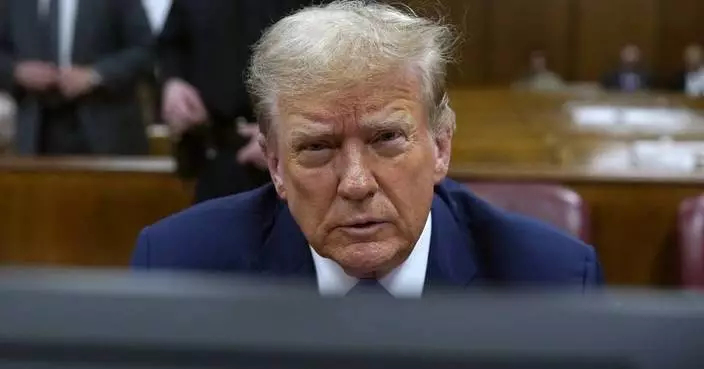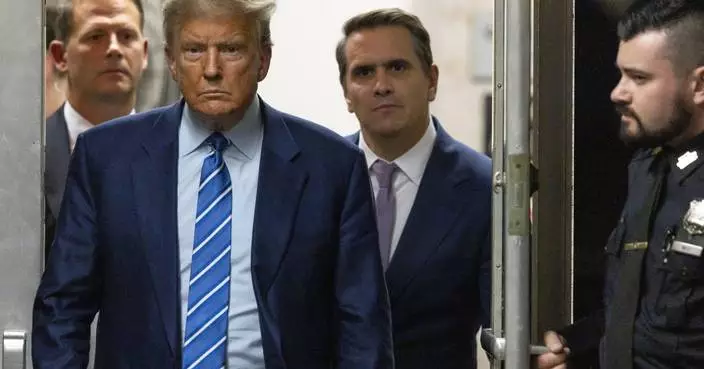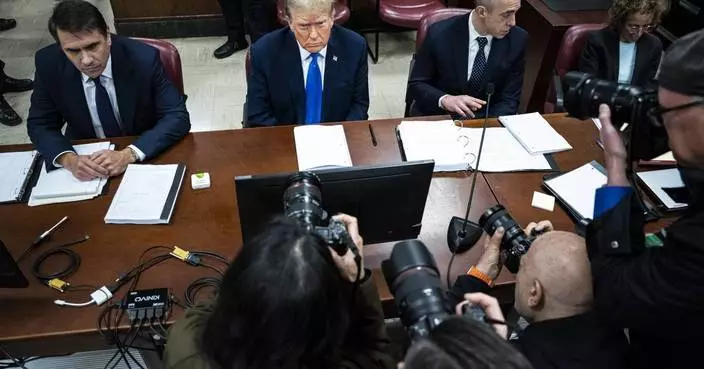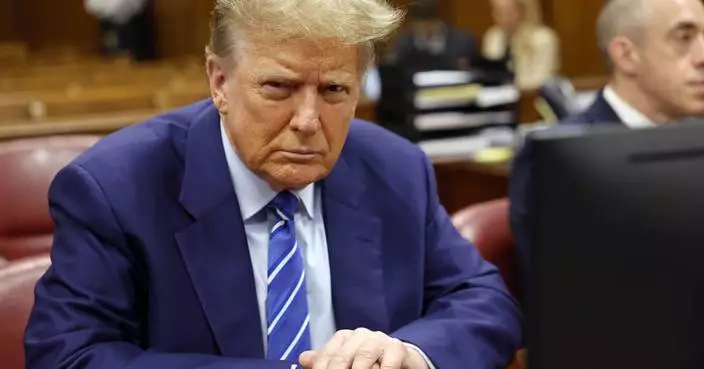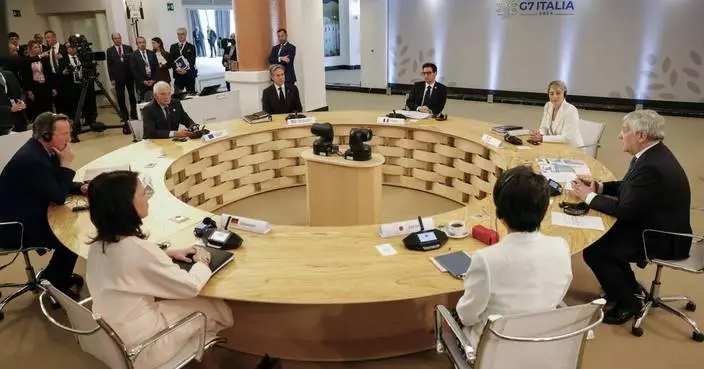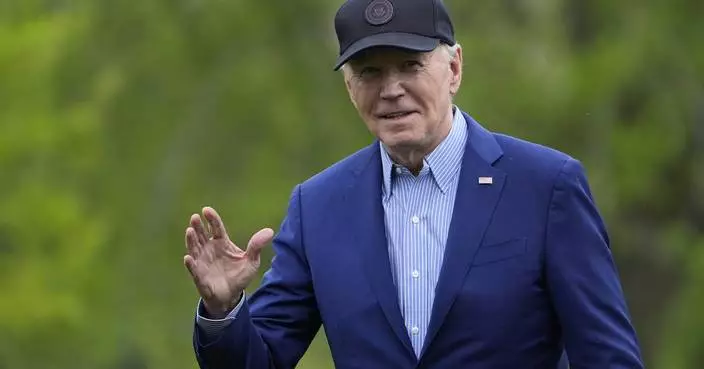Russian President Vladimir Putin described a list of his country's officials and tycoons put together to comply with a U.S. sanctions law as a hostile and "stupid" move spearheaded by President Donald Trump's political foes, but said Tuesday that the Kremlin would refrain from retaliating for now.
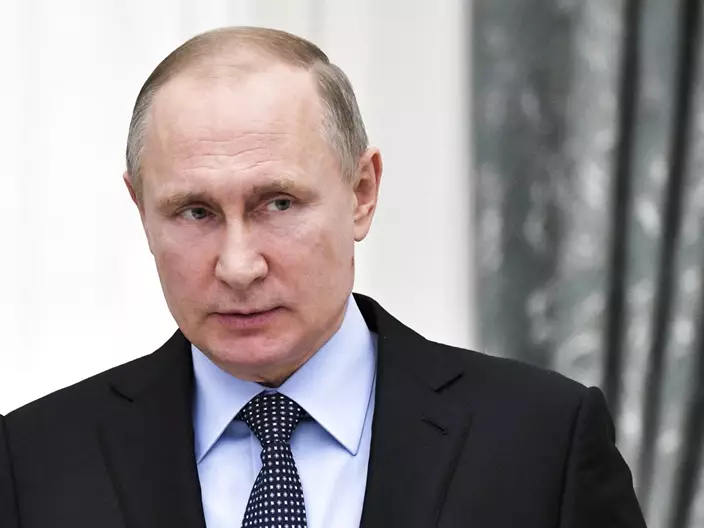
In this photo taken on Monday Jan. 29, 2018, Russian President Vladimir Putin attends the ceremony of signing a 2018-2020 general agreement between Russian trade unions, employers and the Russian Government in Moscow, Russia. (Alexei Nikolsky, Sputnik, Kremlin Pool Photo via AP)
A continent away, Democrats in Washington lodged the opposite complaint, charging that Trump had let Putin off the hook. They chastised the president for declining to punish anyone under a part of the sanctions law that was intended to isolate Russia's defense and intelligence sectors for Moscow's alleged meddling in the 2016 election.
Click to Gallery
Russian President Vladimir Putin described a list of his country's officials and tycoons put together to comply with a U.S. sanctions law as a hostile and "stupid" move spearheaded by President Donald Trump's political foes, but said Tuesday that the Kremlin would refrain from retaliating for now.
A continent away, Democrats in Washington lodged the opposite complaint, charging that Trump had let Putin off the hook. They chastised the president for declining to punish anyone under a part of the sanctions law that was intended to isolate Russia's defense and intelligence sectors for Moscow's alleged meddling in the 2016 election.
"All of us, all 146 million, have been put on some kind of list," he said at a meeting with activists for his election campaign. "Certainly, this is an unfriendly move, which further exacerbates the already strained Russia-U.S. relations and hurts international relations as a whole."
"The president of the United States is not taking action to defend this nation," charged Sen. Ben Cardin of Maryland, the top ranking Democrat on the Foreign Relations Committee. Alluding to potential future election-meddling, Cardin said that if Putin "sees softness in the U.S. resolve, he will do more."
Senior State Department officials declined repeatedly to provide examples or public evidence of any planned sales that will no longer go through. But some of those examples were conveyed to Congress in a classified memo and classified briefings, two individuals familiar with the situation said.
Yet State Department officials emphasized that Monday's deadline was merely the first date the administration could legally use the new sanctions, suggesting more action could come later. Under fire from Senate Democrats on the same issue, Treasury Secretary Steven Mnuchin said Tuesday that "there will be sanctions that come out of this report."
Putin, whose approval ratings top 80 percent, is set to easily win another six-year term in the March 18 election that would put him on track to become Russia's longest-serving leader since Josef Stalin. But the Kremlin has been worried about voter apathy that could make his showing less impressive.
Putin's reluctance to criticize Trump suggested the Russian leader still harbors hopes for normalizing ties with the United States. At the same time, the blanket list of 210 names — a who's who of Russian officialdom and business elite — could help him win re-election in March by fueling anti-Western sentiment.
Mixing sarcasm and scorn, Putin immediately struck that chord Tuesday, saying that the people the U.S. named control companies employing millions of Russians. The list has spooked rich Russians, who fear it could get them informally blacklisted in the global financial system. But Putin cast the action in Washington as a blow to ordinary people.
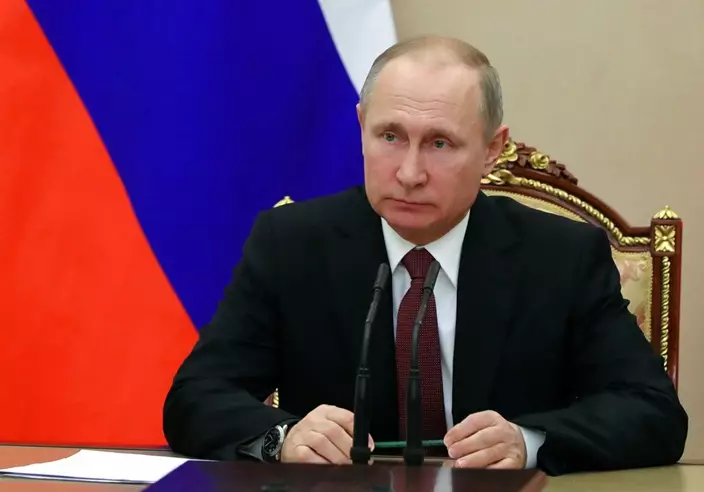
In this Jan. 26, 2018, photo, Russian President Vladimir Putin chairs a Security Council meeting in Moscow, Russia. The State Department has notified Congress that it will not impose new sanctions on Russia at this time. (Mikhail Klimentyev, Sputnik, Kremlin Pool Photo via AP)
"All of us, all 146 million, have been put on some kind of list," he said at a meeting with activists for his election campaign. "Certainly, this is an unfriendly move, which further exacerbates the already strained Russia-U.S. relations and hurts international relations as a whole."
Yet in the U.S. capital, the so-called "Putin list" was greeted with a collective shrug — mocked by some after it was revealed that the Treasury Department had prepared it by simply copying and pasting Forbes' list of Russians worth $1 billion or more.
Instead, Russia hawks and Trump's opponents were focused on why his administration opted not to punish anybody — at least for now — using new sanctions authority that took effect Monday.
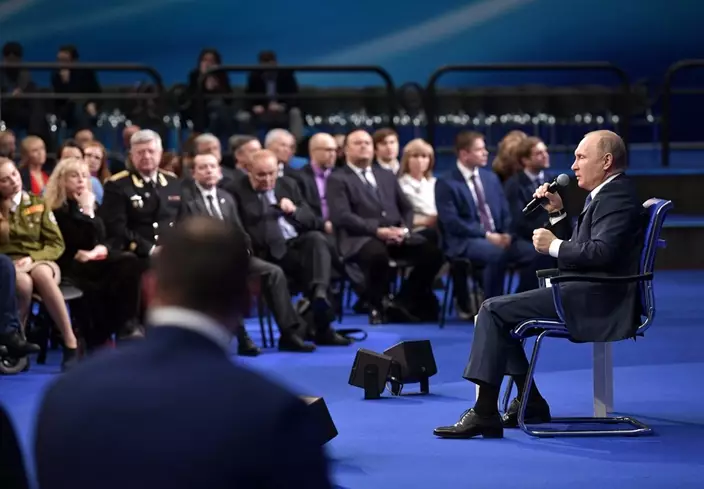
Russian President Vladimir Putin, right, speaks to his supporters during a meeting for his campaign in Moscow, Russia, Tuesday, Jan. 30, 2018. (Alexei Nikolsky, Sputnik, Kremlin Pool Photo via AP)
"The president of the United States is not taking action to defend this nation," charged Sen. Ben Cardin of Maryland, the top ranking Democrat on the Foreign Relations Committee. Alluding to potential future election-meddling, Cardin said that if Putin "sees softness in the U.S. resolve, he will do more."
Both requirements — that the U.S. issue a list of powerful Russians and start using sanctions to punish those doing "significant" business with Russian defense and intelligence companies — were included in a law Congress passed last year in response to alleged Russian interference in the U.S. presidential campaign. Trump's administration had until Monday to take both steps.
On the sanctions, though, the administration decided it didn't need to penalize anyone — including several U.S. allies that have had multibillion-dollar arms deals with Russia in the works — because the threat of sanctions had been enough of a deterrent. The State Department said that through demarches to foreign countries and other diplomatic conversations, the U.S. had scuttled potential deals worth billions of dollars to the Russians.
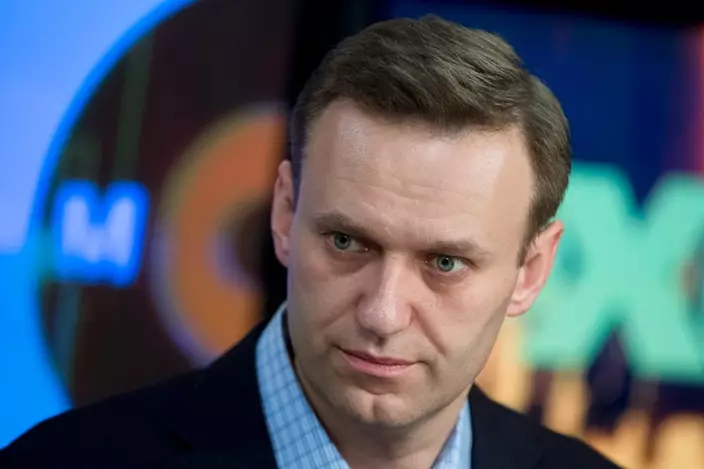
FILE - In this file photo dated Wednesday, Dec. 27, 2017, Russian opposition activist Alexei Navalny pauses, at the Echo Moskvy (Echo of Moscow) radio station in Moscow, Russia. (AP Photo/Pavel Golovkin, File)
Senior State Department officials declined repeatedly to provide examples or public evidence of any planned sales that will no longer go through. But some of those examples were conveyed to Congress in a classified memo and classified briefings, two individuals familiar with the situation said.
One said that the administration had given Congress a list of 10 deals the U.S. believes will not go forward because the sanctions threat had been effective. The officials weren't authorized to discuss the details and demanded anonymity.
"He's ignoring them and he's not implementing them, even though they were mandatory," Senate Democratic Leader Chuck Schumer said of Trump and the sanctions.
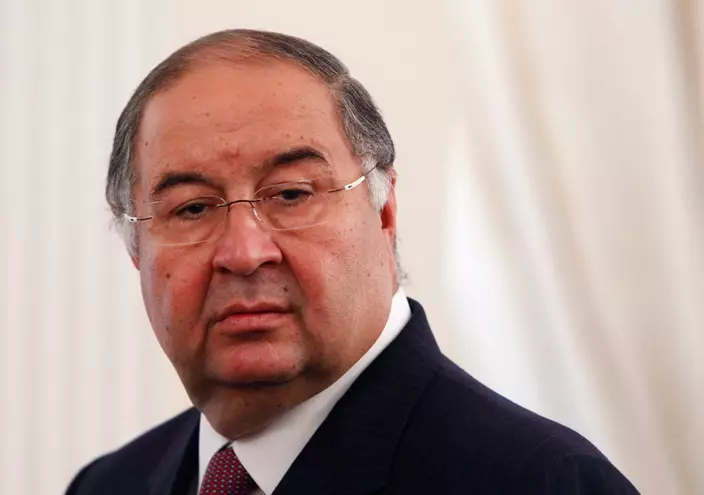
FILE - In this Thursday, Sept. 12, 2013 file photo, Uzbek-born Russian businessman Alisher Usmanov attends a meeting of Russian President Vladimir Putin and Crown Prince Sheik Mohammed bin Zayed Al Nahyan of the United Arab Emirates at the Novo-Ogaryovo state residence outside Moscow. (Maxim Shemetov/Pool Photo via AP, File)
Yet State Department officials emphasized that Monday's deadline was merely the first date the administration could legally use the new sanctions, suggesting more action could come later. Under fire from Senate Democrats on the same issue, Treasury Secretary Steven Mnuchin said Tuesday that "there will be sanctions that come out of this report."
The sanctions targeting foreigners buying defense products from Moscow are separate from the list of Russian politicians and wealthy businesspeople, who do not face any U.S. sanctions merely for being on that list. Yet some observers said the list could help Putin consolidate his support base by burnishing his image of a strong leader who stands up to a hostile U.S.,
"This is a gift to Putin in the context of the presidential campaign," said Andrei Kolesnikov of the Carnegie Moscow Center.
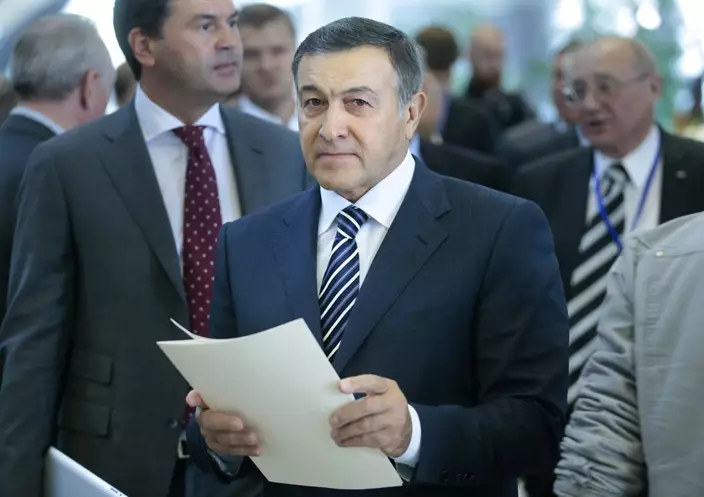
FILE - In this Aug. 30, 2012 file photo, Russian businessman Aras Agalarov, center, is seen in Moscow. (AP Photo/Mikhail Metzel, File)
Putin, whose approval ratings top 80 percent, is set to easily win another six-year term in the March 18 election that would put him on track to become Russia's longest-serving leader since Josef Stalin. But the Kremlin has been worried about voter apathy that could make his showing less impressive.
Notably, Putin pointedly steered clear of criticizing Trump, describing the list as part of U.S. political infighting.
"Those who are doing it are focusing mostly on internal politics. They are assailing the U.S. president," Putin said. He said the Kremlin had pondered possible retaliation while waiting for the list to be announced, but decided to refrain from action.
The idea of the seven-page unclassified document, as envisioned by Congress, was to name and shame those believed to be benefiting from Putin's tenure, as the U.S. works to isolate his government diplomatically and economically. Russia hawks in Congress had pushed the administration to include certain names, while Russian businessmen hired lobbyists to keep them off.
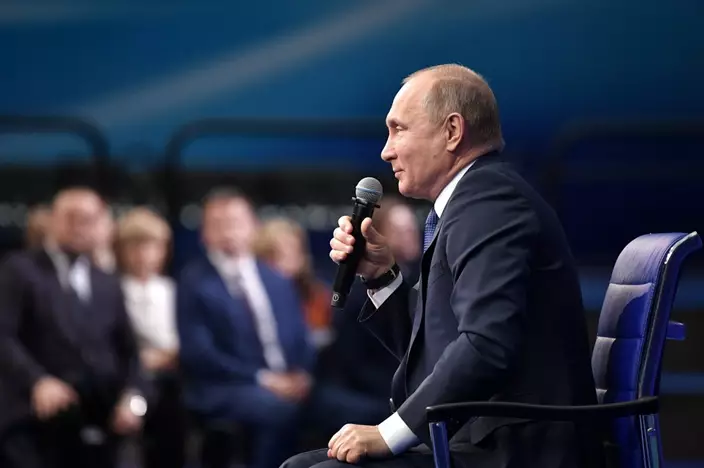
Russian President Vladimir Putin speaks to his supporters during a meeting for his campaign in Moscow, Russia, Tuesday, Jan. 30, 2018. (Alexei Nikolsky, Sputnik, Kremlin Pool Photo via AP)
The list comprises 114 Russian officials — the whole of Putin's administration, as listed by the Kremlin on its website, plus the Russian Cabinet, top law enforcement officials and senior executives at state-owned companies. A companion list of 96 "oligarchs" is a carbon copy of Forbes magazine's Russian billionaires' rankings, only arranged alphabetically. It makes no distinction between those who owe their fortunes to close ties with the Kremlin and those who don't. Some of the people on the list have long fallen out of favor with the Kremlin.
Officials said more names, including those of less-senior politicians and businesspeople worth less than $1 billion, are on a classified version of the list being provided to Congress. Drawing on U.S. intelligence, the Treasury Department also finalized a list of at least partially state-owned companies in Russia, but that list, too, was classified and sent only to Congress.
Russian troops are ramping up pressure on exhausted Ukrainian forces to prepare to seize more land this spring and summer as muddy fields dry out and allow tanks, armored vehicles and other heavy equipment to roll to key positions across the countryside.
With the war in Ukraine now in its third year and a vital U.S. aid package for Kyiv slowed down in Congress, Russia has increasingly used satellite-guided gliding bombs — which allow planes to drop them from a safe distance — to pummel Ukrainian forces beset by a shortage of troops and ammunition.
Despite Moscow's advantage in firepower and personnel, a massive ground offensive would be risky and — Russian military bloggers other experts say — unnecessary if Russia can stick to smaller attacks across the front line to further drain the Ukraine military.
“It’s potentially a slippery slope where you get like a death by a thousand cuts or essentially death by a thousand localized offensives,” Michael Kofman, a military expert with the Carnegie Endowment, said in a recent podcast to describe the Russian tactic. If the Russians stick to their multiple pushes across the front, he said, “eventually they may find more and more open terrain.”
Last summer’s counteroffensive by Ukraine was doomed when advancing Ukrainian units got trapped on vast Russian minefields and massacred by artillery and drones. The Russians have no reason to make that same mistake.
Last November, Ukrainian President Volodymyr Zelenskyy ordered his forces to build trenches, fortifications and bunkers behind the more than 1,000-kilometer front line, but analysts say construction work moved slowly, leaving areas unprotected.
“If the defensive lines had been built in advance, the Ukrainians wouldn’t have retreated in such a way,” Ukrainian military expert Oleh Zhdanov said. “We should have been digging trenches through the fall and it would have stemmed Russian advances. Now everything is exposed, making it very dangerous.”
In a recent podcast, Kofman also said that Kyiv is “quite behind on effectively entrenching across the front” and “Ukraine does not have good secondary lines.”
After capturing the Ukrainian stronghold of Avdiivka, Russian troops are zeroing in on the hill town of Chasiv Yar, which would allow them to move toward Sloviansk and Kramatorsk, key cities in the Kyiv-controlled part of the Donetsk region in eastern Ukraine. Russia illegally annexed Donetsk and three other regions in 2022, and the Kremlin sees fully controlling that region as a priority.
Zhdanov said Ukraine doesn't have the firepower to repel Russian attacks.
“They promised to have a defensive line 10 kilometers (6 miles) behind Avdiivka where our troops could get and dig in, but there is none,” he said.
Gen. Christopher Cavoli, head of U.S. European Command, sounded the alarm before Congress last week, warning that Ukraine will be outgunned 10 to one by Russia in a matter of weeks if Congress does not approve more military aid.
After securing another term in a preordained election in March, President Vladimir Putin vowed to carve out a “sanitary zone” to protect Russia's border regions from Ukrainian shelling and incursions.
Putin didn't give any specifics, but Russian military bloggers and security analysts said that along with a slow push across the Donetsk region, Moscow could also try to capture Ukraine’s second-largest city of Kharkiv, which Russia tried and failed to take in the opening days of the war.
In a possible sign of a looming attack on Kharkiv, a city of 1.1 million about 30 kilometers (some 20 miles) south of the border, Russia has ramped up strikes on power plants in the area, inflicting significant damage and causing blackouts.
Ukraine doesn't have enough air defense to protect Kharkiv and other cities, and the constant Russian strikes are part of Moscow's strategy to “suffocate” it by destroying its infrastructure and forcing its residents to leave, Zhdanov said.
Retired Lt. Gen. Andrei Gurulev, now on the defense committee of Russia’s lower chamber of parliament, acknowledged that capturing Kharkiv is a major challenge, and he predicted the military would try to surround it.
“It can be enveloped and blockaded,” he said, adding that taking Kharkiv would open the way for a push deep into Ukraine and require more Russian troops.
After Putin’s order for “partial mobilization” of 300,000 reservists last fall proved so unpopular that hundreds of thousands fled abroad to avoid being drafted, the Kremlin tried a different approach: It promised relatively high wages and other benefits to beef up its forces with volunteer soldiers. The move appears to have paid off as Defense Minister Sergei Shoigu said the military recruited 540,000 volunteers in 2023.
“There are no plans for a new wave of mobilization,” Viktor Bondarev, deputy head of defense affairs committee in the upper house of parliament, said in remarks carried by state RIA Novosti news agency. “We are doing well with the combat capability that we have.”
Follow AP's coverage at https://apnews.com/hub/russia-ukraine
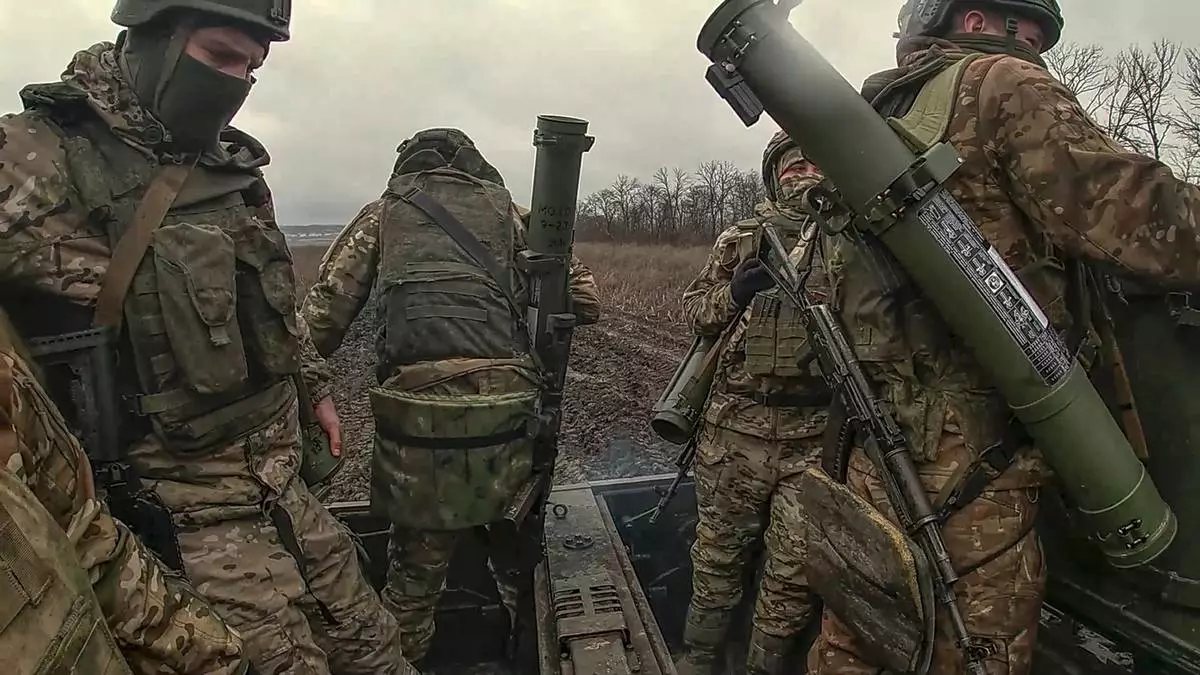
FILE - In this photo taken from video released by the Russian Defense Ministry on April 9, 2024, Russian soldiers carrying flamethrowers ride an armored vehicle in an undisclosed location in Ukraine. Russian troops have been ramping up pressure on exhausted Ukrainian forces across the front line to prepare to take more land this spring and summer. (Russian Defense Ministry Press Service via AP, File)
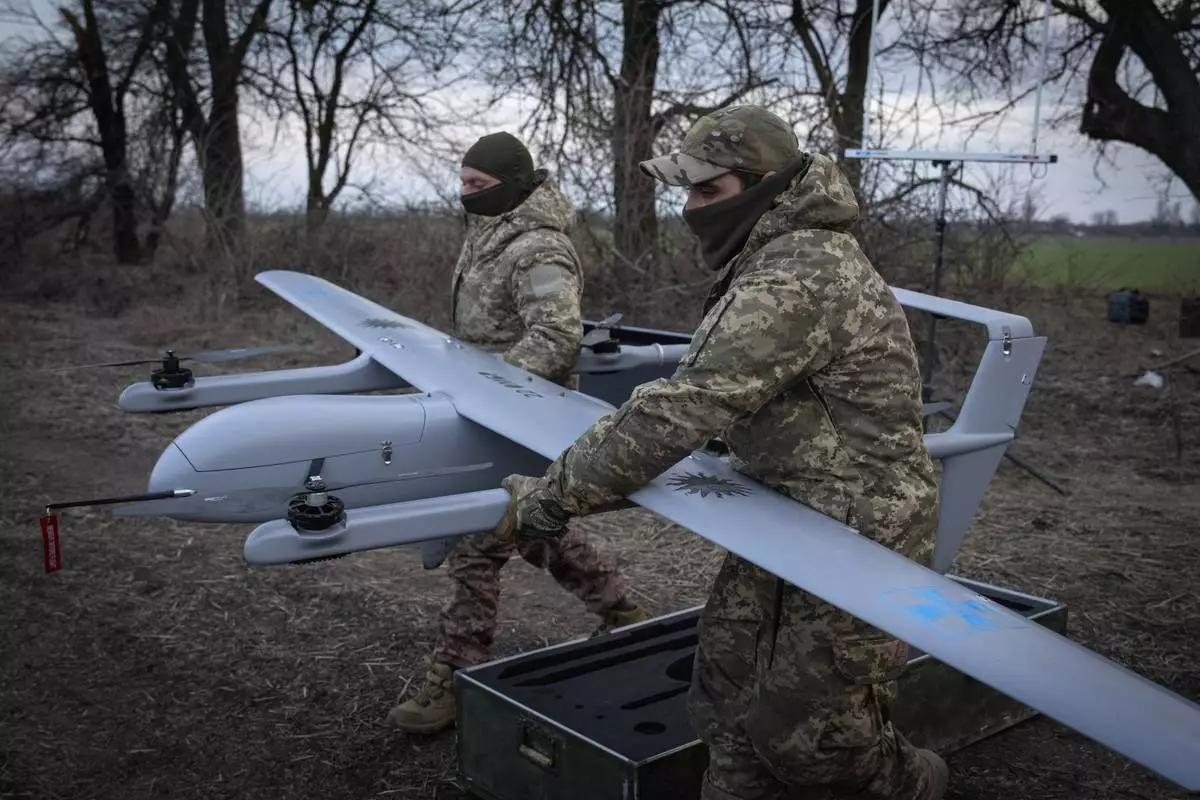
FILE - Ukrainian soldiers with the 22nd Mechanized Brigade prepare to launch the Poseidon H10 Middle-range drone near the city of Bakhmut in Ukraine’s Donetsk region on March 26, 2024. (AP Photo/Efrem Lukatsky, File)
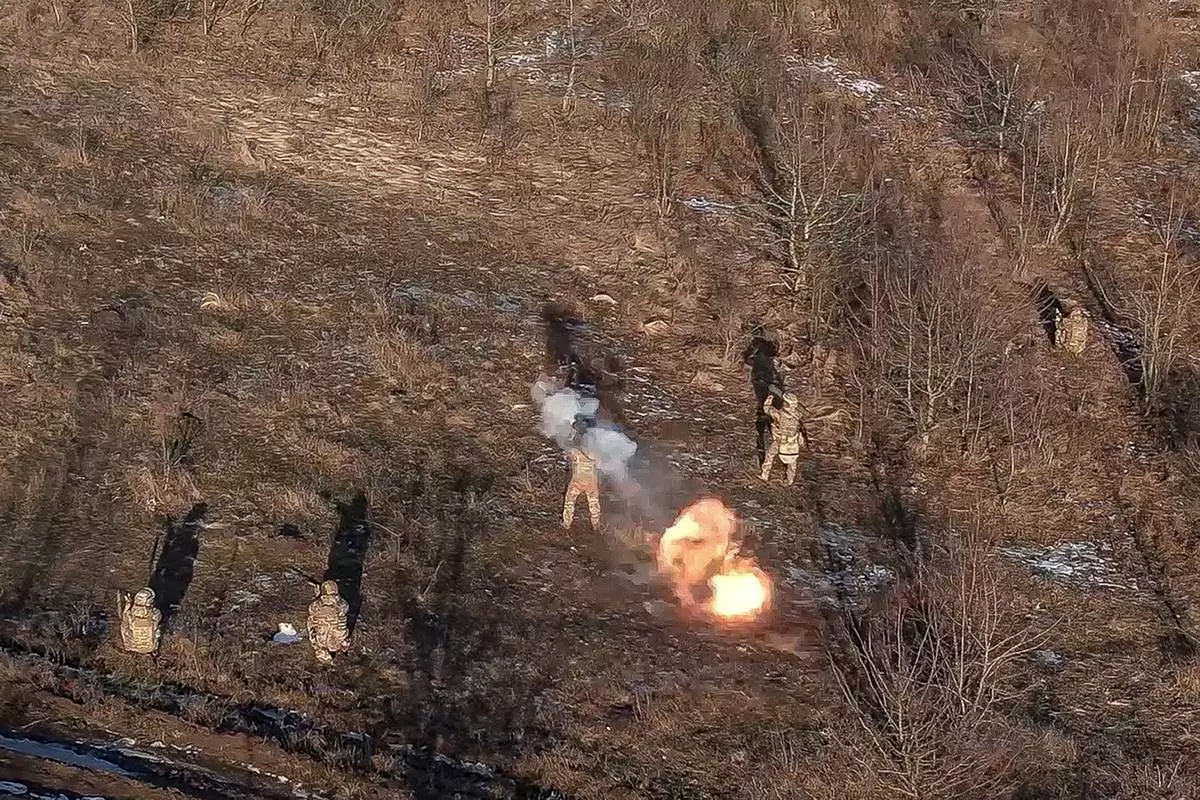
FILE - In this image released by the Russian Defense Ministry on April 9, 2024, Russian soldiers fire flamethrowers at Ukrainian positions in an undisclosed location in Ukraine. (Russian Defense Ministry Press Service via AP, File)
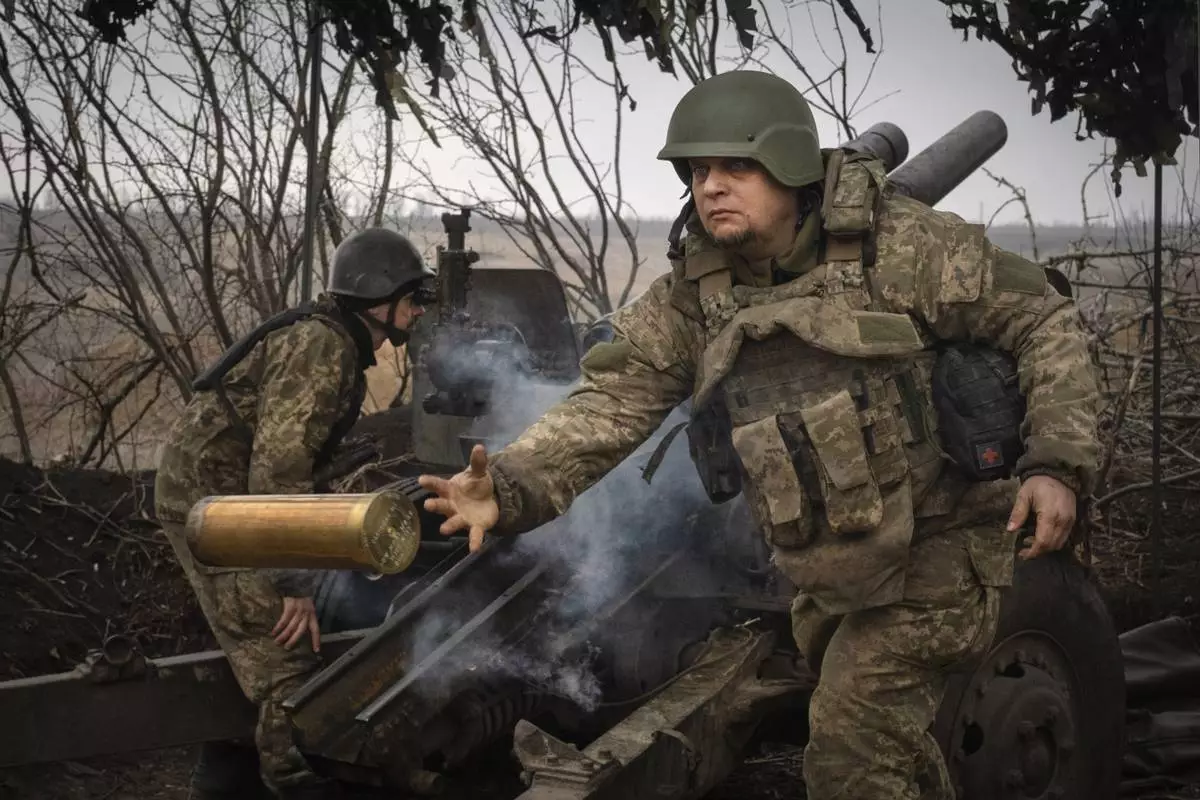
FILE - Ukrainian soldiers with the 71st Jaeger Brigade fire a M101 howitzer at Russian positions on the front line, near the city of Avdiivka in Ukraine’s Donetsk region, on March 22, 2024. (AP Photo/Efrem Lukatsky, File)
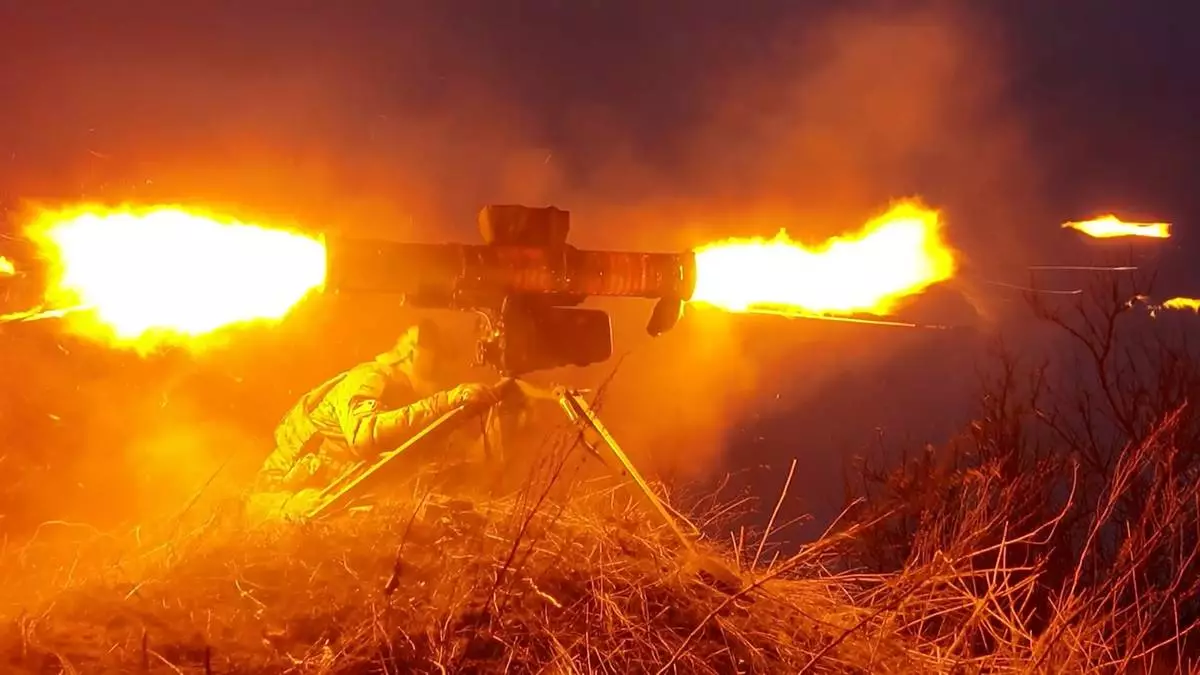
FILE - In this video frame grab released by the Russian Defense Ministry on March 26, 2024, a Russian soldier in an undisclosed location fires an anti-tank missile at Ukrainian forces. Russian troops have been ramping up pressure on exhausted Ukrainian forces across the front line to prepare to take more land this spring and summer. (Russian Defense Ministry Press Service photo via AP, File)
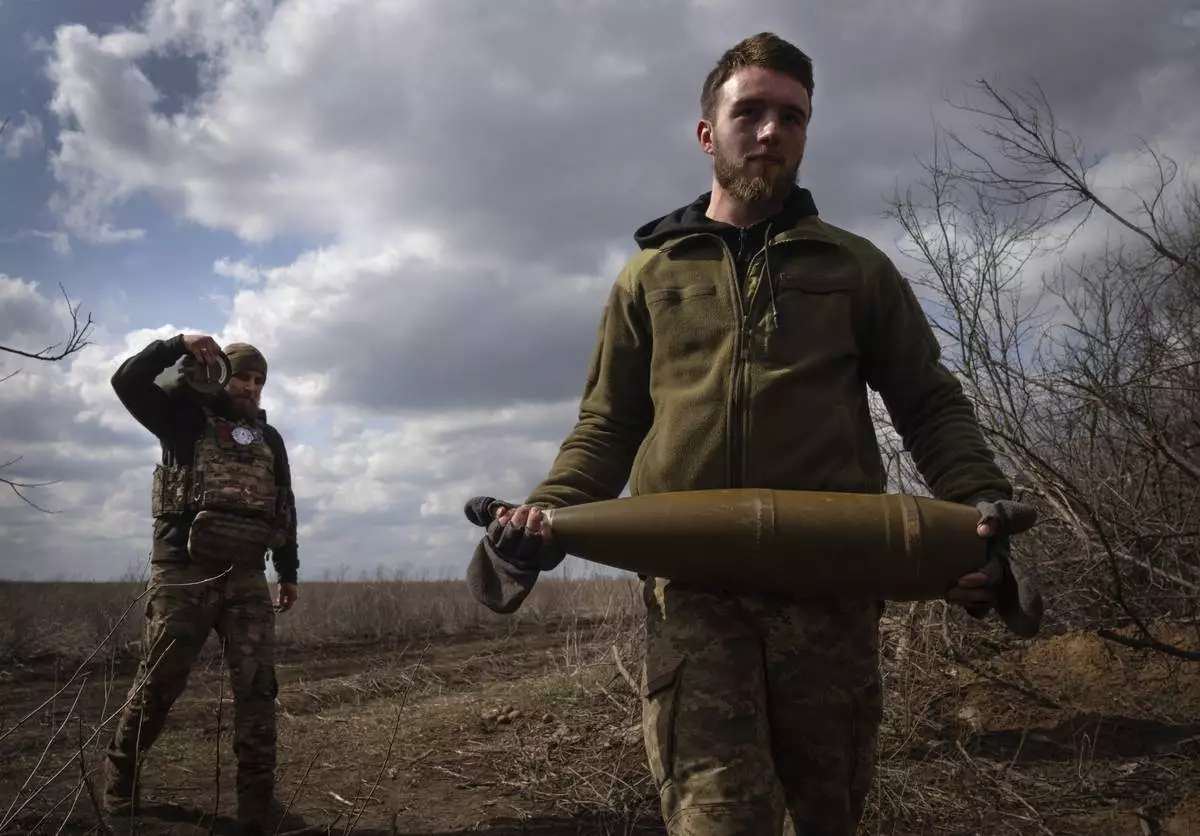
FILE - Ukrainian soldiers carry shells to fire at Russian positions on the front line, near the city of Bakhmut, in Ukraine's Donetsk region, on March 25, 2024. The outgunned and outnumbered Ukrainian troops are struggling to halt Russian advances as a new U.S. aid package is stuck in Congress. (AP Photo/Efrem Lukatsky, File)
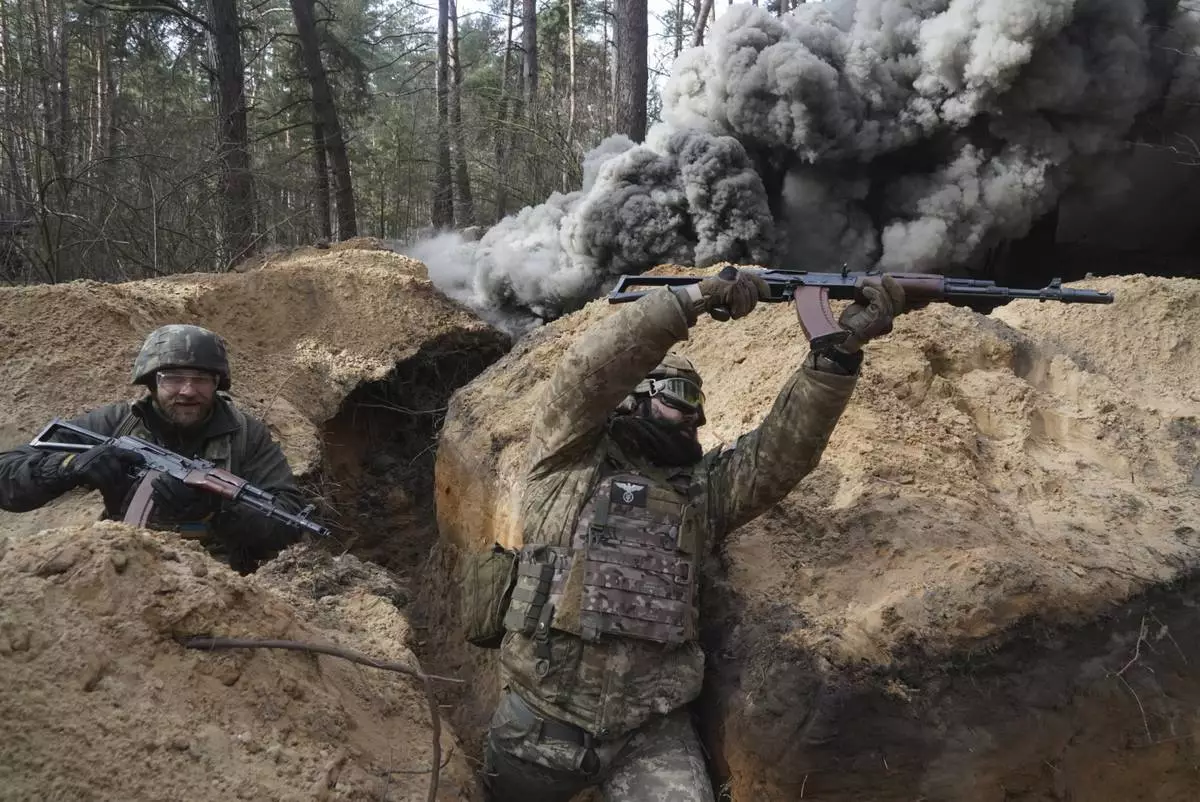
FILE - Ukrainian National Guard soldiers simulate an assault during tactical training at a shooting range in Ukraine’s Kharkiv region on Feb. 29, 2024. (AP Photo/Andrii Marienko, File)
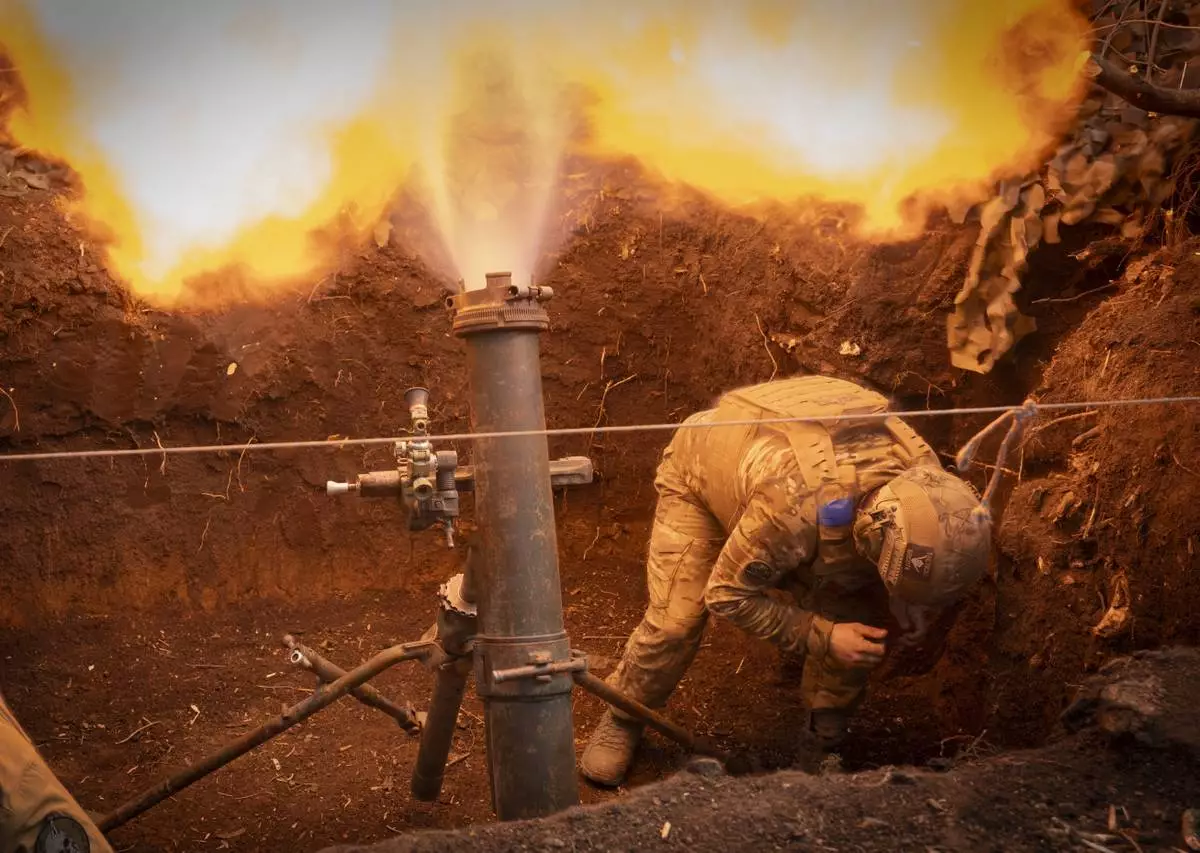
FILE - Ukrainian servicemen with the 28th Separate Mechanized Brigade fire a mortar at Russian forces on the front line near the city of Bakhmut in Ukraine’s Donetsk region, on March 3, 2024. The outgunned and outnumbered Ukrainian troops are struggling to halt Russian advances as a new U.S. aid package is stuck in Congress. (AP Photo/Efrem Lukatsky, File)
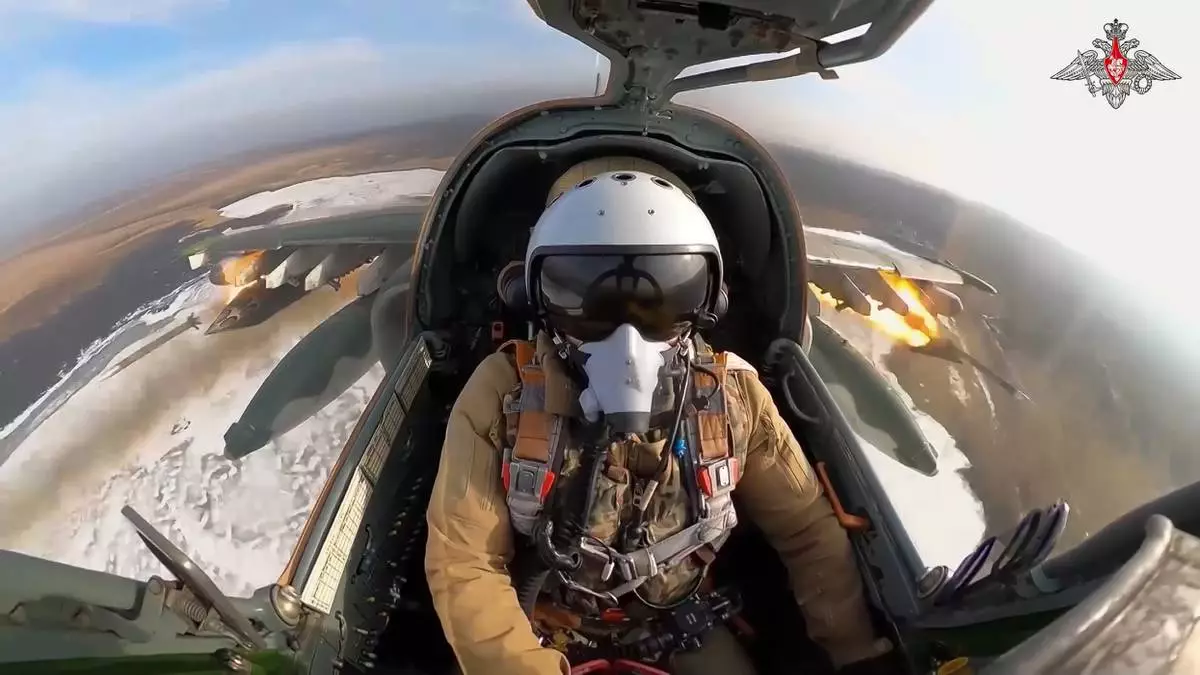
FILE – This frame grab from video released by the Russian Defense Ministry on Feb. 20, 2024, shows one of its Su-25 ground attack jets firing rockets during a mission over Ukraine. (Russian Defense Ministry Press Service via AP, File)
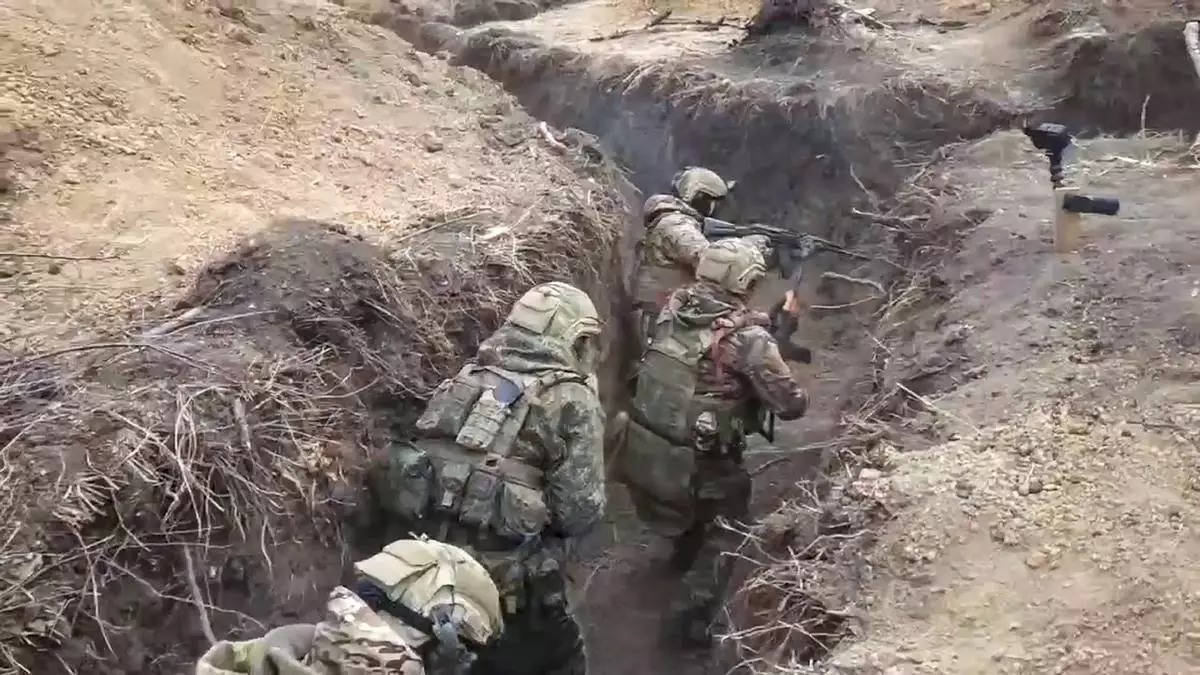
FILE - In this image released by the Russian Defense Ministry on March 19, 2024, Russian soldiers participate in a military exercise somewhere in the Russian-controlled Donetsk region in eastern Ukraine. (Russian Defense Ministry Press Service via AP, File)
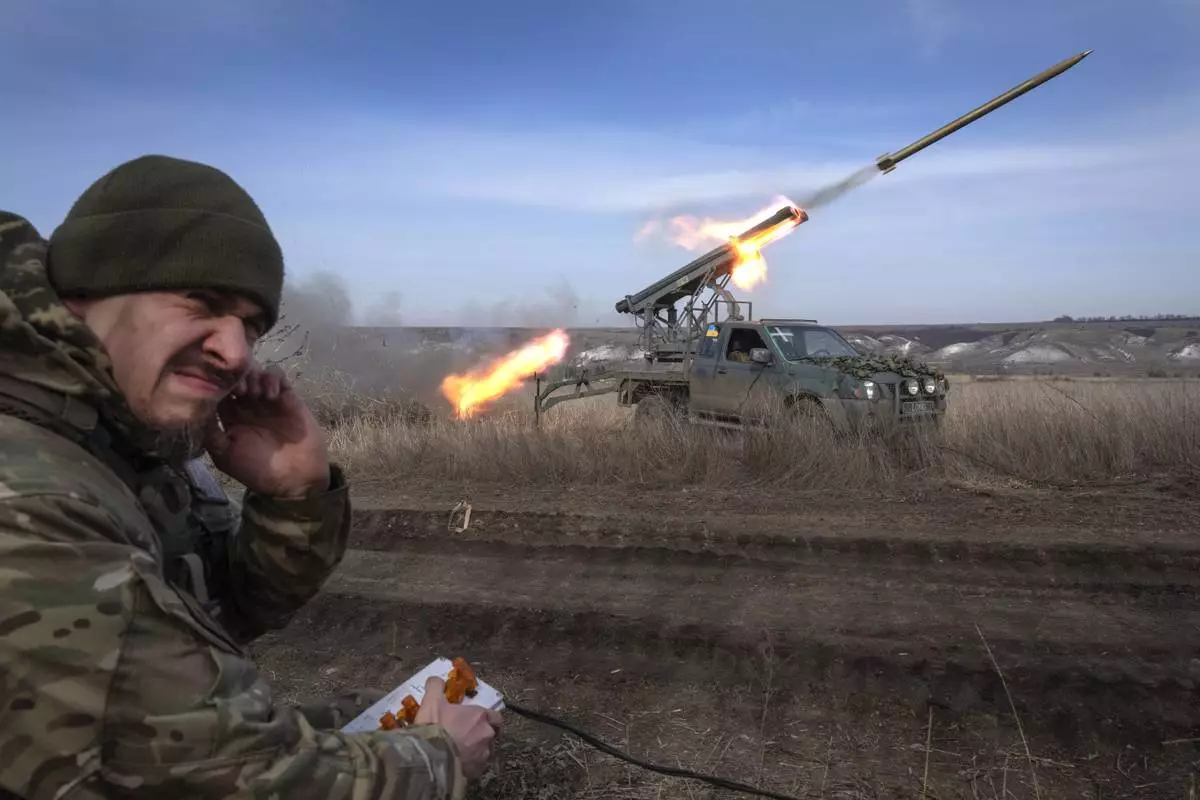
FILE - A Ukrainian officer with the 56th Separate Motorized Infantry Mariupol Brigade fires rockets from a pickup truck at Russian positions on the front line near Bakhmut in Ukraine’s Donetsk region on March 5, 2024. The outgunned and outnumbered Ukrainian troops are struggling to halt Russian advances as a new U.S. aid package is stuck in Congress. (AP Photo/Efrem Lukatsky, File)
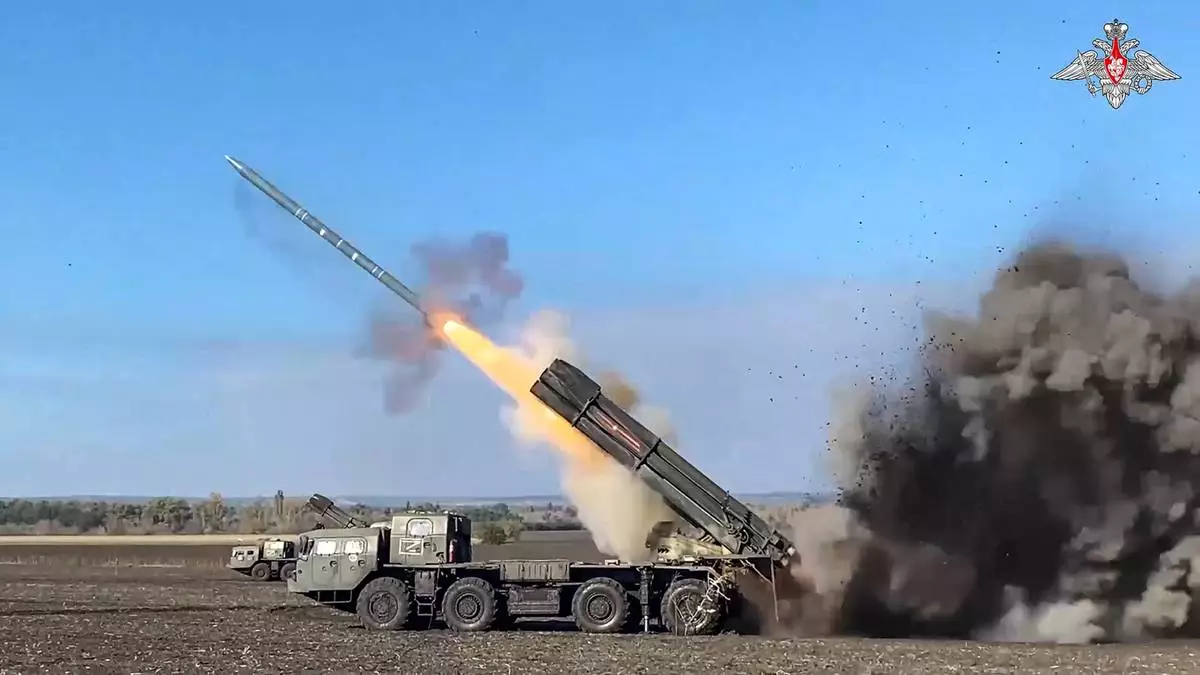
FILE - In this image taken from video released by the Russian Defense Ministry on March 21, 2024, a Russian rocket launcher fires at an undisclosed location in Ukraine. Russian troops have been ramping up pressure on exhausted Ukrainian forces across the front line to prepare to take more land this spring and summer. (Russian Defense Ministry Press Service via AP, File)
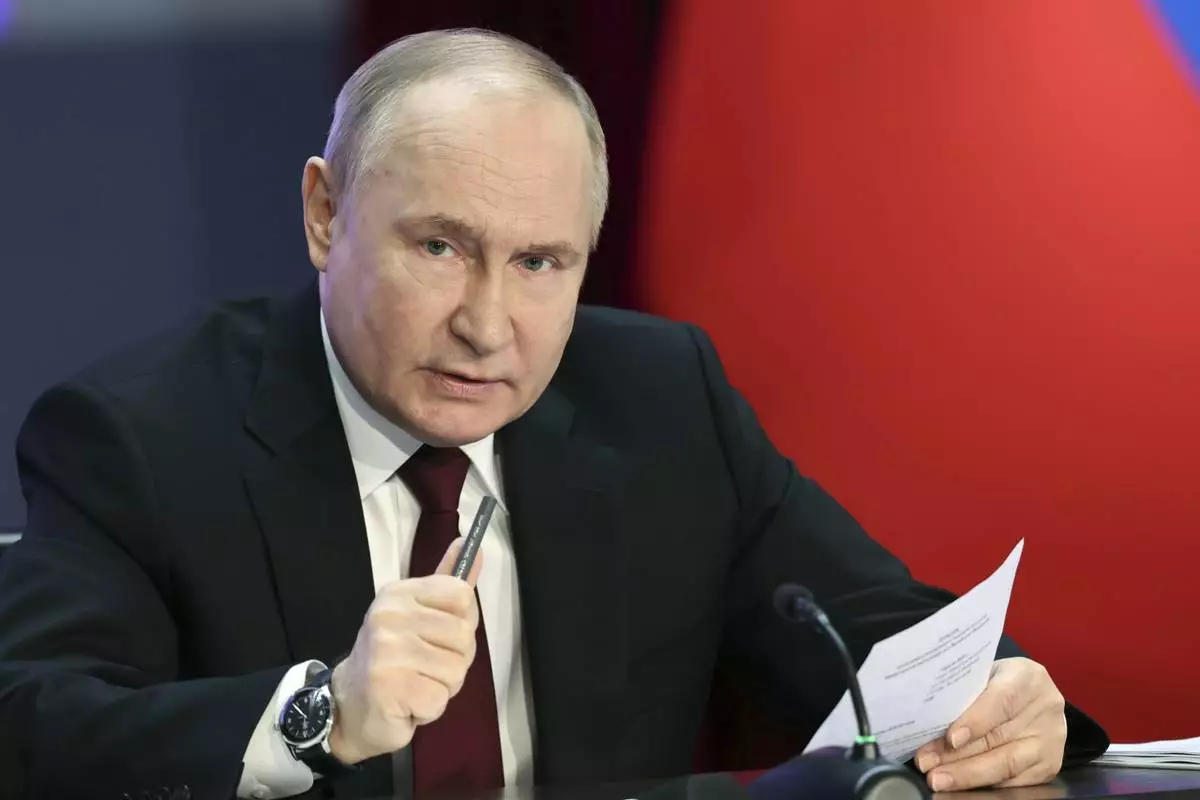
FILE - Russian President Vladimir Putin speaks at the annual meeting of Russian Interior Ministry Board in Moscow on April 2, 2024. After securing another term in a preordained election in March, Putin vowed to extend Moscow's gains in Ukraine to carve out a "sanitary zone" protecting Russian border regions from Ukrainian shelling and incursions. (Sergei Savostyanov, Sputnik, Kremlin Pool Photo via AP, File)
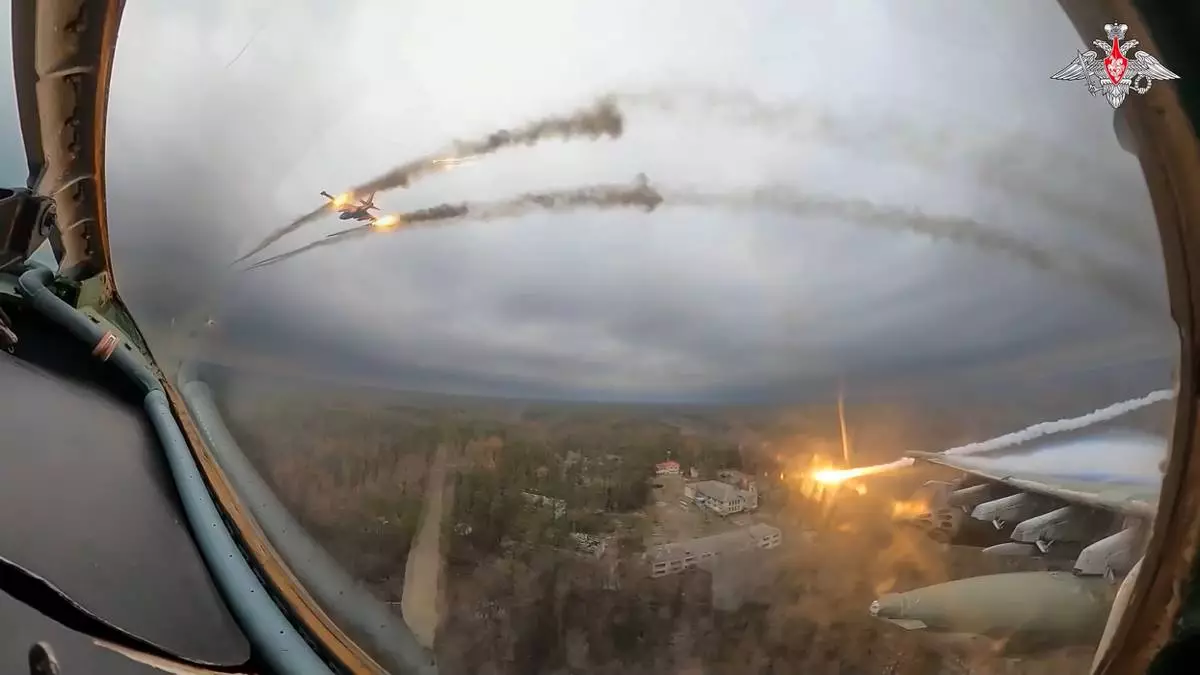
FILE – A Su-25 plane is seen firing rockets over Ukraine in a video frame grab. The video was taken from inside another Su-25 plane and released by the Russian Defense Ministry on Jan. 22, 2024. (Russian Defense Ministry Press Service via AP, File)
























